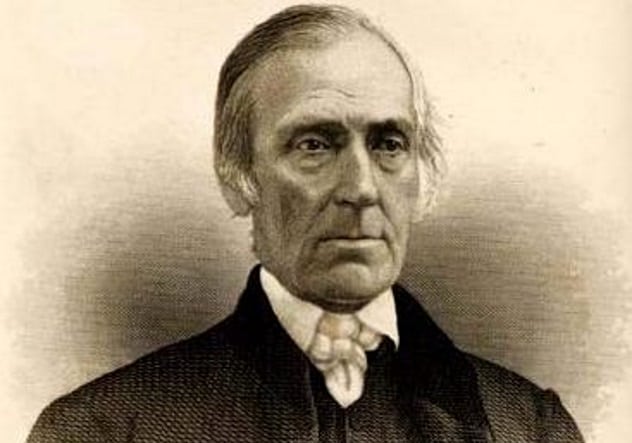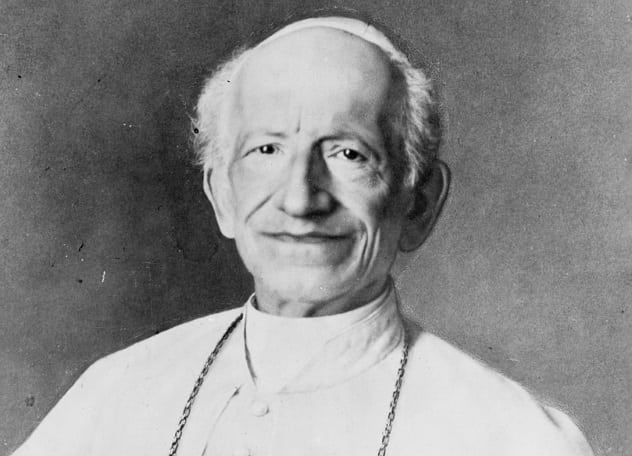 Mysteries
Mysteries  Mysteries
Mysteries  History
History 10 Surprising Stories About the Texas Rangers
 Humans
Humans 10 Philosophers Who Were Driven Mad by Their Own Theories
 Miscellaneous
Miscellaneous 10 Video-Game-Worthy Weapons and Armors from History
 Weird Stuff
Weird Stuff 10 Psychics Who Accurately Predicted Wartime Events
 The Arts
The Arts 10 Pieces of Art Inspired by a Broken Heart
 Health
Health 10 Science Fiction-Sounding New Medical Treatments
 History
History 10 Surprising Facts About the Father of Submarine Warfare
 Space
Space Ten Astonishing New Insights into Alien Worlds
 Weird Stuff
Weird Stuff 10 Bizarre Summer Solstice Rituals Still Practiced Today
 Mysteries
Mysteries Top 10 Haunting Facts About the Ghost Ship MV Alta
 History
History 10 Surprising Stories About the Texas Rangers
 Humans
Humans 10 Philosophers Who Were Driven Mad by Their Own Theories
Who's Behind Listverse?

Jamie Frater
Head Editor
Jamie founded Listverse due to an insatiable desire to share fascinating, obscure, and bizarre facts. He has been a guest speaker on numerous national radio and television stations and is a five time published author.
More About Us Miscellaneous
Miscellaneous 10 Video-Game-Worthy Weapons and Armors from History
 Weird Stuff
Weird Stuff 10 Psychics Who Accurately Predicted Wartime Events
 The Arts
The Arts 10 Pieces of Art Inspired by a Broken Heart
 Health
Health 10 Science Fiction-Sounding New Medical Treatments
 History
History 10 Surprising Facts About the Father of Submarine Warfare
 Space
Space Ten Astonishing New Insights into Alien Worlds
 Weird Stuff
Weird Stuff 10 Bizarre Summer Solstice Rituals Still Practiced Today
10 Times The Religious Were Forward-Thinking
Religions of the world, though many and varied, have a few negative reputations in common. They don’t always gel with social or political issues, and more liberal-minded people can see religions as being too conservative, or a little behind the times at best. In general, it can be said that there’s often a stereotypical association between religiosity and being “backward.”
There have, however, been some interesting exceptions to this stereotype. Here, we’ll look at ten times through history that the religious were more forward-thinking than some of their contemporaries.
10 Nudity

Around 170,000 years ago, humans started wearing animal skins, not out of shame but just because someone realized it could help to protect from cold. The idea of needing to cover specific body parts was a concept introduced by religion. Consider, for instance, how Christian missionaries have taught less “civilized” cultures to be modest about their nakedness.
However, one Christian sect from the second through fourth centuries, the Adamites, felt differently about nudity. They claimed to have recovered the pre-apple innocence of the Garden of Eden and lived and worshiped in the buff. They were considered heretics and lived in anarchy: Since they claimed to predate all good and evil, whatever they did was innocent.[1]
9 Quakers And Social Equality

We all know that many religions preach equality, but in doing so, they’ve often left some people or groups out. The Quakers who settled in America, however, actually had a pretty good report card for practicing what they preached. Though they did own slaves early on, like the rest of American colonists, they were forerunners in the abolitionist movement, deciding that slavery was unchristian and therefore should be outlawed. They were also major players in the Underground Railroad.
Quakers truly did seem to believe that people are equals, having many ties to social justice, including the suffragette movement, as well as asylum and prison reform.[2] We also have to remember that the first recorded candy bar was created by a Quaker, too, but that’s a story of liberty for another day.
8 Mandatory Charity

Put your money where your mouth is. Likewise, while charity is a tenet of most religions and is popular, for some Muslim countries, it is the law. In Saudi Arabia, Pakistan, and several other nations, citizens must give 2.5 percent of their wealth to those in need.[3] In other Muslim countries, this alms, or zakat, is encouraged but optional. There have been reported instances of corruption as misappropriation in the system, but besides knowing that some of our taxes will ultimately benefit disadvantaged people, it’s a nice idea to have to specifically give a chunk of what’s ours to others.
Europe, too, has some ties between church and state. In many of its countries, Christian denominations still collect a tithe. This is a little different than zakat because it’s understood that a lot of the money will go to the church and its upkeep, though a portion will go to the needy as well. Typically, if someone identifies as a member of a church, he’ll be taxed. In some countries, the member can opt out, but in others, such as Germany, for example, the only way out of the tax is to leave the church, which many Catholics and Protestants have been doing.
7 Meaninglessness Of Gender

When we think over the story of Adam and Eve as it’s discussed in most Christian denominations, it’s probably clear there’s little interpretation about the division of genders. However, one 11th-century European sect, the Cathars, had an interesting take on sex and sexuality. Devoted believers led strict, abstinent, and ascetic lives, which went hand in hand with their very transcendent views. To them, gender and sexuality were not natural, purposeful creations of God but a punishment for sin upon the angels; these matters were inconsequential and earthly. Souls have no sex. One upside of this lack of interest was that Cathar women were equals to men, and the movement attracted a sizeable portion of female followers for this reason.
Cathars looked down on carnality, but oddly, sex for pleasure was better than for procreation. The logic behind this was that continuing to bear children of sin only dragged out a flawed humanity. The metaphysical goal was to break the chain of reincarnation. For similar reasons, followers were also vegan.[4]
6 Valuing Life And The Natural World

Though many religions promote a reverence for life, few take things as far as Jainism, which began in India around 500 BC. Beings are classified according to different sense faculties, but basically, humans are even with all other life, including insects and microorganisms. For this reason, Jainists will not eat food left out overnight, for fear of harming accumulated bacteria. They may also sweep the ground before them with a broom to avoid stepping on insects or wear face masks to avoid inhaling them.
Something interesting for us to think about here is that although Jainism and modern science aren’t exactly two peas in a pod, the religion does present a thoughtful, experiential classification of the world’s creatures not unlike environmental activism.[5] Jainism expands the idea that humanity is not central in its explanation of the universe, which the religion claims was not created but has always been and will always be. Its matter is neither created nor destroyed but changed, an idea that compares to law of conservation of mass, formulated over a millennium later.
5 Strict Holiday Rules

Jehovah’s Witnesses don’t celebrate any holidays that aren’t in the Bible. It may not surprise us that followers of the faith don’t celebrate Christmas, but Easter isn’t observed, either.[6] Though both holidays commemorate significant Christian events, they were institutionalized by the first few Christian emperors of Rome and debatably have some pagan influence.
Though the reason for not celebrating some holidays is religious, the result is effectively anti-consumerist. The expectations of gift-giving and elaborate decorations and parties can make us dupes of the dollar. And it’s not as though people often started holidays with ill intent, but industries stepped in to capitalize. Father’s Day and Mother’s Day, for instance, started innocently enough but have become prime opportunities to push men’s products or jewelry and flowers. Next time you hear something like, “I don’t celebrate any mainstream holidays invented to reinforce commercial capitalism,” you may be talking to a Jehovah’s Witness, not a hipster.
4 Making The Dead Useful

Being dead can be costly in terms of money, space, planning, and environmental impact. Caskets, funeral services, and burial plots add up. In 2012, the National Funeral Directors Association pegged the average cost of a funeral in the United States at $7,045. Our dead bodies also take up space on an overcrowded planet and can contaminate water supplies for the living. Even cremation pollutes the air.
Some Tibetan Buddhists are more practical when it comes to the dead. They have a practice called jhator (aka sky burial), whereby the recently deceased are discarded in an exposed area to be eaten by vultures.[7] They consider this the most reasonable means of contributing to the living with an empty husk of meat.
3 Monogamy Can Mean A Better Love Life

Despite stereotypes we may have of religious people having vanilla sex lives, some studies (such as a 2012 experiment by the Department of Sociology at the University of Texas), as well as anecdotal evidence, suggest that Christians in the US are having more, better sex.[8] Why? One reason seems to be that although promiscuity or sex before marriage are taboo, sex is often highly encouraged as part of a happy, healthy Christian relationship—and marriage is quite sacred. One famous academic article, “The Social Organization of Sexuality,” actually proposed that religious women experience more orgasms.
Of course, there is a dark side to this abundance of libidinal energy—much of it can be dammed up from repression of whatever is outside the dogma. Many studies indicate that religious people are more prone to sexual obsessions and resultant behavior due to trying to bury illicit thoughts. Still, though happiness and satisfaction can, in many ways, be only subjectively measured, there may be some benefits to pious matrimony.
2 Labor Reform

The Catholic Church was outspoken about unethical labor practices before the US legislated policies to reform the institution. In 1891, Pope Leo XIII published a papal letter, known as Rerum Novarum (Of the New Things), in which he discussed issues of the current labor climate, as well as ideas for improvement. Although over the years, religion has often impacted economics and addressed social issues, it is interesting that the pope’s message coincided with the uprising of the working class, the common people.
He openly criticized capitalistic greed and employer corruption and supported specific aspects of contemporary working-class lobbying and change, such as the formation of unions.[9] Pope Leo also recommended collective bargaining and even minimum wage, which was not made a law in the US until 47 years after Rerum Novarum, in the Fair Labor Standards Act of 1938.
1 Making A Point About Labels

Last names are our calling cards. They once told what clan a person was in and what his family did for work, e.g. Smith, Carpenter, Wagner, and so forth. Under India’s caste system, your name designated the social class to which you belonged. Although the system has socioeconomic roots, it was incorporated as part of Hindu principles. Another Indian religion, Sikhism, began in the 15th century and used castes as well. However, the religion’s ninth guru, Tegh Bahadur, wanted no discrimination, and he had a brilliant idea: abolish surnames and abolish castes. Actually, the idea was that everyone would adopt the same surname, Singh.[10] The practice still continues in some respects to this day, though only some choose to do it. Overall, however, the caste system does exist in Sikhism.
The concept of changing a name for religious or social reasons is not unique to this movement in Sikhism. After all, women typically change their last name to their husband’s. Originally, this was the law, as unmarried women had limited legal rights without a husband, so the shared name allowed her a little more power as a dependent. Furthermore, followers of religion are often assigned a spiritual name at birth or after undertaking certain vows or rites. Even many cult members have followed this practice, often as a way of renouncing former selves. What’s unique about Guru Tegh Bahadur’s idea is that giving everyone the same name makes them equal.
+ Transubstantiatial Psychonauts: Jesus And Drugs

This one’s cheating a little, as the origin is academic and anti-ecclesiatical. In 1970, British professor John Allegro published a book called The Sacred Mushroom and the Cross about how the founders of Christianity were tripping on psychedelic mushrooms. Essentially, he claimed that Jesus was actually the Amanita muscaria mushroom, which explains the Christian eating of the host.[11] The book was very controversial, but Allegro wasn’t just some nut; he was part of a team of scholars studying the recently discovered Dead Sea Scrolls. Much of his interpretation was founded in ambiguous language in the ancient texts.
In any case, some other famous works corroborate with the general idea of secularizing or demystifying Christianity. In The Golden Bough, for example, James George Frazer links the death and rebirth of Christ to more ancient myths based on cycles of nature.
I’m 34, live in Chicago, and an a freelance writer. I also teach creative writing to kids. My website is https://ericvanorman.wixsite.com/internet.
Read more facts about world religions that may surprise you on 10 Pious People Who Defy Common Religious Stereotypes and 10 Dramatic Ways Major Religions Have Reversed Positions.








